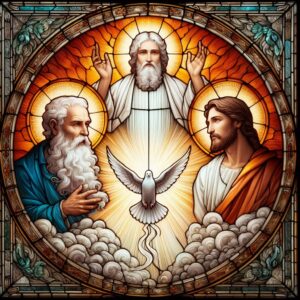Who Are the Father, the Son, and the Holy Spirit?
The Father is considered the source and sustainer of life. He is depicted as the supreme being who initiates the creation of the universe and all life within it. He maintains and governs the universe according to divine law and order. Christians pray to the Father and acknowledge His overarching plan and authority in the workings of the world and in their personal lives.
Jesus is called the Son. He was born on Earth as a human being, fully divine yet fully man. His life was a model for us in how to live and love others. Jesus taught us about God’s love, showed us how to be kind, and ultimately, sacrificed Himself for humanity’s wrongdoings. Understanding Jesus, we learn more about what God is like because He is God made visible, someone we can connect with directly.
The Holy Spirit is the presence of God which enacts the will of God in the world. After Jesus’s ascension to Heaven, the Holy Spirit was sent to be a helper, teacher, and guide for believers. This Spirit plays a necessary role in the lives of Christians today, offering guidance, comfort, and spiritual gifts that enable individuals to live righteously and effectively contribute to their communities of faith. The Holy Spirit convicts individuals of their wrongdoing, prompts them towards repentance, and empowers them to embrace a life modeled after Christ’s teachings.
How Do They Work Together?
The Father is acknowledged as the creator of everything in existence. The New Testament reveals that the Son, through whom all things were made, played an important role in creation (John 1:3). The sustaining and governing of the universe is achieved in conjunction with the Holy Spirit, who renews and preserves the creation (Psalm 104:30). This shows a harmonious action among the Trinity in the realm of creation and ongoing providence.
The plan to redeem humanity is a divine orchestration involving all three persons of the Trinity. The Father, in His love, initiates salvation by sending the Son to redeem mankind (John 3:16). The Son, Jesus Christ, consents to the Father’s will and accomplishes the act of redemption by dying on the cross for humanity’s sins and rising from the dead, thereby overcoming the power of sin and death (Ephesians 1:7). Once Jesus ascends back to heaven, the Holy Spirit is sent to apply the benefits of Christ’s redemptive work to believers.
The teachings and example of Jesus, recounted in the Gospels and expounded by His apostles, form the foundation for Christian conduct and spirituality. The Holy Spirit illuminates these teachings, helps believers understand and apply them, and provides the spiritual strength necessary to enact them in daily life. This empowerment allows believers to fulfill the commandments of the Father and live lives that honor Him.
Why Does the Trinity Matter to Us Today?
Knowing God as Father, Son, and Holy Spirit enriches our prayer and worship life. We can approach God as our Father with a sense of belonging and protection, relate to Jesus Christ as the Son who redeems and empathizes with our human experiences and depend on the Holy Spirit for guidance and strength in our everyday challenges. This multi-faceted relationship enhances our spiritual resilience and gives us a more comprehensive understanding of who God is and how He operates in our lives.
 The relational dynamics within the Trinity—where different personas exist in unity and mutual support—serve as a blueprint for Christian community life. This model fosters an understanding of unity in diversity within church communities. As the Trinity functions in harmonious unity without erasing the distinct roles of the Father, the Son, and the Holy Spirit, so too can church members appreciate and utilize diverse gifts and functions within a united mission. This teaches tolerance, mutual respect, and collaboration which are essential values for maintaining peace and unity in any community.
The relational dynamics within the Trinity—where different personas exist in unity and mutual support—serve as a blueprint for Christian community life. This model fosters an understanding of unity in diversity within church communities. As the Trinity functions in harmonious unity without erasing the distinct roles of the Father, the Son, and the Holy Spirit, so too can church members appreciate and utilize diverse gifts and functions within a united mission. This teaches tolerance, mutual respect, and collaboration which are essential values for maintaining peace and unity in any community.
Understanding teachings within the context of the Trinity helps believers see the interconnectedness of Christian ethics with divine love and truth. It underscores the consistency of God’s character and His expectations for human conduct. The life and sacrifice of Jesus articulate the profundity of selfless love and service, while the Holy Spirit empowers believers to live out these principles in practical ways, thus impacting personal ethics and societal norms.
The eternal relationship between the Father, the Son, and the Holy Spirit gives believers a perspective of their eternal destiny to live in a restored relationship with God and each other. This eternal view impacts how Christians approach their life purposes, prioritize their values, and interact with the temporal world. Recognizing that life on earth is just a part of a vast eternal plan can provide comfort and hope amidst suffering and confusion, reinforcing the sovereignty of God over all circumstances.
How Can You Grow in Understanding the Trinity?
Regular reading and study of both the Old and New Testaments provide insights into how the Trinity functions and its relevance to God’s overarching plan. Focus on passages that explicitly mention the interactions between the Father, Son, and Holy Spirit, such as the baptism of Jesus (Matthew 3:16-17) or the Great Commission (Matthew 28:19). Tools such as study Bibles, commentaries, and Bible study groups can also offer deeper insights and explanations that aid understanding.
Listening to sermons, attending Bible studies, and participating in discussion groups within a church setting is invaluable for growing in understanding. These settings provide the opportunity to hear different perspectives and questions from others that you might not consider on your own. Pastors and teachers in the church are typically trained in theology and can provide clear teachings on complex doctrines like the Trinity.
Take time to meditate on what you learn about the Father, Son, and Holy Spirit. Prayer is a necessary avenue for seeking deeper understanding. You can ask God to provide clarity and deeper insight into His nature as you study and reflect.
Reading books and articles by reputable Christian authors can expand your understanding and introduce nuances that are not immediately apparent in scriptural texts alone. This literature can range from ancient works by Church Fathers to contemporary theological discussions.
Engaging in conversations about the Trinity with fellow believers or leaders in your church can further enhance your understanding. These discussions can clarify doubts, provide different angles on the subject, and help cement your ideas and understanding through articulation. Teaching others about the Trinity can deepen your comprehension as you prepare and seek to clearly and effectively communicate its principles.
Look for seminars, workshops, or conferences focusing on Christian doctrines, including the Trinity. These are often led by theologians or scholars who can provide in-depth teaching and answer complex questions on the subject. These events can also offer a broader community of learners, which enriches the learning experience.
